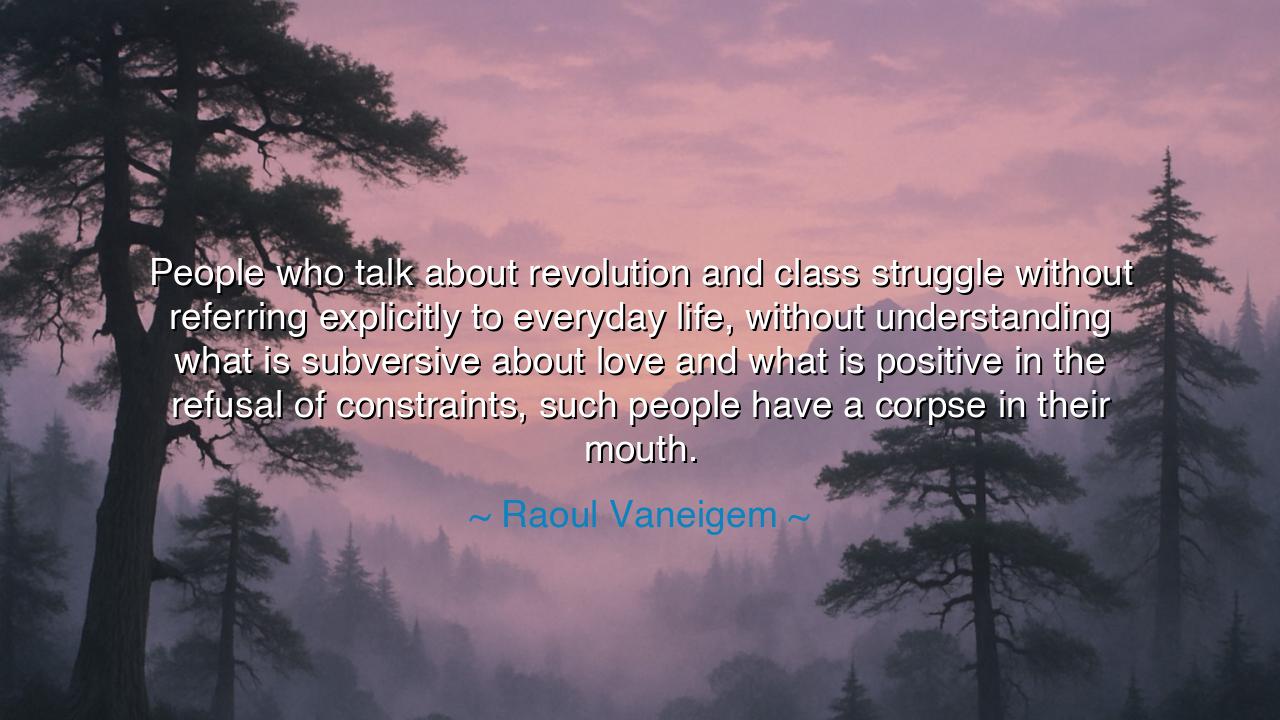
People who talk about revolution and class struggle without
People who talk about revolution and class struggle without referring explicitly to everyday life, without understanding what is subversive about love and what is positive in the refusal of constraints, such people have a corpse in their mouth.






“People who talk about revolution and class struggle without referring explicitly to everyday life, without understanding what is subversive about love and what is positive in the refusal of constraints, such people have a corpse in their mouth.” Thus spoke Raoul Vaneigem, a voice of the Situationist Movement, a philosopher who saw that true revolution was not forged merely in the streets or in the shouts of crowds, but in the quiet, living heart of the everyday human experience. His words are fierce and poetic, accusing and illuminating all at once. He warns that to speak of freedom, yet ignore the vital forces of life—love, joy, spontaneity, the rebellion of the soul—is to speak as one already dead. For Vaneigem believed that the revolution of the world begins not in ideology, but in the revolution of the self.
To understand his words, one must first understand his time. Vaneigem lived in the turbulent 1960s, an age of protest, of political uprisings and cultural awakening. He was part of a generation that sought to tear down the hollow structures of consumerism, conformity, and control. Yet he saw a tragic irony among many who called themselves revolutionaries: they raged against the system, but still lived within its cage. They spoke of liberty, yet were slaves to habit, routine, and fear. They shouted of justice, but had lost the vital pulse of love, the simple joy that makes freedom worth having. So he said — those who speak of revolution but ignore life itself have “a corpse in their mouth,” for their words are lifeless, their ideals hollow, their passion buried beneath rhetoric.
Vaneigem’s revolution of everyday life was not a call to chaos, but to awakening. He sought not a revolution of governments, but of hearts — a rising of the human spirit against all that dulls, numbs, and enslaves it. He believed that love is the most subversive of all forces, for it defies domination, refuses hierarchy, and unites where power divides. To love deeply, freely, without possession or fear — that, to Vaneigem, was an act of rebellion greater than any speech. And to refuse constraints, to live authentically, to reject the gray monotony of existence imposed by authority and conformity — that, too, was the essence of his revolution. For what good is overthrowing rulers if one remains a prisoner within one’s own soul?
The truth of his words can be seen throughout history. Consider Vaclav Havel, the Czech playwright who became a revolutionary and later a president. Before he ever held office, Havel fought tyranny through art, through words that spoke to the human heart. His plays were banned, his voice silenced, but he refused to stop writing — because he knew that the freedom of expression, the celebration of everyday truth, was itself revolutionary. He lived the very spirit Vaneigem described: revolution as the affirmation of life, of creativity, of compassion. He understood that a movement divorced from humanity, from the living pulse of love, becomes a machine — and machines, however efficient, are dead things.
Vaneigem’s words burn with contempt for those who turn revolution into a slogan rather than a way of being. He tells us that a true revolutionary is not one who merely protests, but one who lives fully and fearlessly, who loves without restraint and creates without permission. For it is through such living that systems of control collapse. The person who discovers the joy of being alive no longer bows to fear, and no tyrant can command one who has tasted inner freedom. To live joyously, truthfully, lovingly — this is to rebel against the death that society quietly demands of its people.
Let us then reflect upon what he means by having “a corpse in their mouth.” It is the curse of those who speak of change but have lost the capacity to feel; who worship doctrine but neglect beauty; who cry out for justice but live without tenderness. Their words rot because they have forgotten the essence of life itself. To love, to dream, to embrace the small wonders of existence — these are not trivial acts, but sacred ones. A revolution without them is no revolution at all, but another form of oppression wearing a new mask.
So, my child, learn this truth: revolution begins with love. It begins with the courage to feel, to create, to refuse the dull weight of conformity. Do not speak of freedom if you do not live freely in your heart. Do not demand justice if you do not practice kindness in your home. Tear down the walls of your own indifference, and the world’s walls will follow. Live passionately, think deeply, and give yourself to the beauty of being human — for this, and this alone, is the truest act of rebellion.
In the end, Raoul Vaneigem’s teaching is a call to awaken — to bring vitality back into our words, our work, and our relationships. The world will change not through slogans, but through souls who live in truth and love. Let no corpse dwell in your mouth. Let your speech, your art, your life breathe with living fire. For the only revolution that endures is the one kindled by the human heart — fierce, tender, and forever alive.






AAdministratorAdministrator
Welcome, honored guests. Please leave a comment, we will respond soon